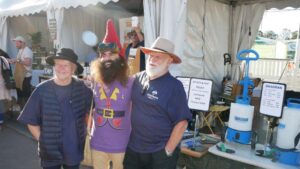
Do you speak my language?
By Daniel Fuller
Do you speak to everybody in the same way? If you do, you’re probably not an effective communicator, and you may be leaving money on the table. Especially when you’re in a job interview or pitching a potential client.
This has nothing to do with authenticity. It’s not being fake to filter the way you speak to build a connection with somebody who may think differently to you. It’s just being a good communicator.
Recently on my podcast, I interviewed a property developer, Karen Fuller, who also just happens to be my mother. The title was a bit tongue-in-cheek, “Horticulturist vs developer.” Because she really doesn’t care about plants, all she wants from her landscapers is a bit of developer’s garnish to help her sell or rent her properties.
By the time the landscaping starts, she’s already exhausted from the marathon that is a property development.
Growing up, I witnessed a number of landscape architects, landscapers, ecologists and other professionals try and fail to win work from her. The reason they failed was almost always because they couldn’t speak her language, and they kept trying to drag her into their own frame and worldview. That’s not the way that the world works. For better or worse.
When we, as passionate plant people, try to engage with a key decision maker, whether that’s an employer or a client, we need to show that person that we understand exactly what they need from us and that we can deliver on it.
In our interview, Karen outlined an example of when she needed to engage an ecologist because there was a potential koala sighting while works were being conducted.
The first ecologist she called assured her that if any signs of a koala were found, that works would be shut down immediately to ensure the koala’s safety. The second ecologist she called asked her questions related to where in the development process she was, informed her of the codes applying to her situation, and was very matter-of-fact about the whole thing.
Which ecologist do you think she went with?
The second ecologist showed her that he understood exactly what she needed, and that he was able to sort the situation out for her. She completely wrote the first one off as an “activist” (her word).
Now, that first ecologist was probably correct in his assessment of the situation. He would probably deal with a koala sighting in exactly the same way that the second ecologist would have. The difference was, the first one scared the living daylights out of Karen because he clearly didn’t appreciate the position that she was in. The level of risk that she’d taken on. The anxiety that she feels every single day, knowing that something could go wrong on-site and send our whole family bankrupt. He wasn’t on her team and that made him a risk to her.
There’s a saying in the sales community, “show me that you know me”, and another that says, “what’s in it for me (the customer)?” Sales is a part of everything related to your career. When you’re in a job interview, you’re selling yourself. When you ask for a promotion, you’re a salesperson. When you try to pitch a new idea to a boss or client, that’s sales.
Next time you try to convince somebody to go your way, get inside their head and understand what makes them tick, because they care much more about themselves and what they want, than what you want.
Daniel Fuller
M: 042 6169 708
E: hello@plantsgrowhere.com
Main photo: Good communication skills are important in every job. Three of the best communicators in the industry – Leonie Sweeney, Costa Georgiadis and Charles Sweeney (Image: Karen Smith)
